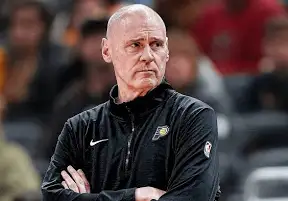
Tyrese Haliburton’s Selflessness Sparks Reflection from Pacers President Kevin Pritchard
Indiana Pacers star guard Tyrese Haliburton has long been admired for his team-first attitude, consistently putting collective success ahead of personal accolades. However, in the wake of a heartbreaking NBA Finals loss, Pacers President Kevin Pritchard recently shared a candid reflection: he wishes Haliburton had been more selfish — just once.

The 2025 NBA Finals had the Indiana Pacers on the cusp of history. Facing off against the Oklahoma City Thunder in a tightly contested seven-game series, Indiana appeared poised to potentially capture its first-ever NBA title. But that dream was abruptly derailed mere moments into the decisive Game 7. Just minutes after tipoff, Haliburton suffered a devastating torn Achilles tendon, ending not only his game but effectively ending his 2025–26 season before it could begin.
Up to that point, Indiana was in control of the game, holding a lead when Haliburton went down. The injury changed the course of the contest and cast a shadow over what was an extraordinary season. More than that, it triggered one of the most painful hypotheticals in franchise history: What if Haliburton had stayed healthy? Could the Pacers have finally lifted the championship trophy?
For Haliburton, there are no second guesses. Despite entering Game 7 nursing a calf strain — an ailment that increased his susceptibility to a more severe injury — he remains firm in his belief that suiting up for the most important game of his career was the right decision. According to him, competing in that moment, injury risk and all, was part of what it meant to be a leader.
But while Haliburton holds no regrets, Pritchard feels differently in hindsight. The Pacers’ longtime executive opened up about his internal conflict during a recent interview. He acknowledged the emotional weight of letting a player make that call, especially one as committed as Haliburton.
“How do you tell a kid he can’t play in Game 7 after he made it through Game 6 without getting hurt?” Pritchard said. “He’s told me many times — and this says everything about who he is — ‘I’d do it again and again.’ But if you ask me whether I’d want him to do it again, my answer is no.”
The statement highlights a complex and emotional contradiction. On one hand, Haliburton’s decision to play was emblematic of his character — tough, committed, and loyal to his teammates. On the other, the devastating consequences of that choice have left the Pacers organization grappling with what could have been.
The debate around players pushing through injuries is not new in sports, particularly at such high stakes. For many athletes, the chance to play in a Game 7 of the NBA Finals — a moment they may never experience again — is worth nearly any risk. Haliburton’s mindset fits that mold. He’s widely known for his team-first mentality, and throughout his career, he’s demonstrated a strong sense of responsibility as the Pacers’ floor general and emotional leader.
Yet, from Pritchard’s perspective, the franchise’s long-term goals now seem more important in retrospect. While he admires Haliburton’s competitive spirit, he also recognizes that the team may have needed to protect him from himself — to step in and make the difficult decision to keep their star player out, despite his willingness to go.
“If we’d won the game before the injury, maybe I’d feel different. Or if we had lost and he didn’t play, maybe that regret would’ve taken a different shape,” Pritchard noted. “But knowing what happened… that injury? It changed everything.”
Haliburton had been dealing with his calf strain throughout the Finals, and the medical staff had flagged it as a concern. Calf strains, while often manageable, can be precursors to more serious lower leg injuries, especially if an athlete returns to high-intensity action too soon. The Pacers’ staff reportedly monitored the situation closely, but the final call was left up to Haliburton and the coaching staff. With the championship on the line, the star guard chose to suit up.
It’s clear that Haliburton’s intentions were pure. He wasn’t thinking about future contracts, personal accolades, or even long-term health. He was thinking about his teammates, the fans, and the opportunity to bring a banner to Indiana for the first time. But Pritchard’s regret illustrates the tension that exists between short-term heroics and long-term sustainability — especially when it involves a franchise cornerstone.
The aftermath of the injury has been difficult for everyone involved. Haliburton’s recovery is expected to keep him off the court for the entire 2025–26 season. The Pacers now face an uphill battle, not just in replacing his production on the court, but also in maintaining momentum after a promising playoff run. The front office has tough decisions to make, and while the team remains hopeful for a full recovery, there’s no denying that the injury has cast a long shadow.
Despite everything, Haliburton has remained optimistic. He’s been a vocal supporter of his teammates during rehab and has reiterated that he made the best decision he could with the information he had. To him, being a leader sometimes means taking risks. And if given the choice again, he says he wouldn’t hesitate.
That unwavering mindset is part of why Haliburton is beloved in Indiana. His loyalty and grit resonate deeply with fans and teammates alike. But for team executives like Pritchard, it’s also a reminder of the responsibility they carry — to sometimes make the unpopular, even painful, choices to protect players in the heat of competition.
Looking back, the 2025 NBA Finals will always carry a tinge of sadness for the Pacers organization. The franchise was close — perhaps a few quarters away — from achieving something historic. And while there’s pride in how far they came, there’s also a lingering question of what might have been if things had played out just a little differently.
For Kevin Pritchard, the lesson is clear: talent and toughness can take a team far, but sometimes, even the most selfless leaders need to be told “no.”
Leave a Reply